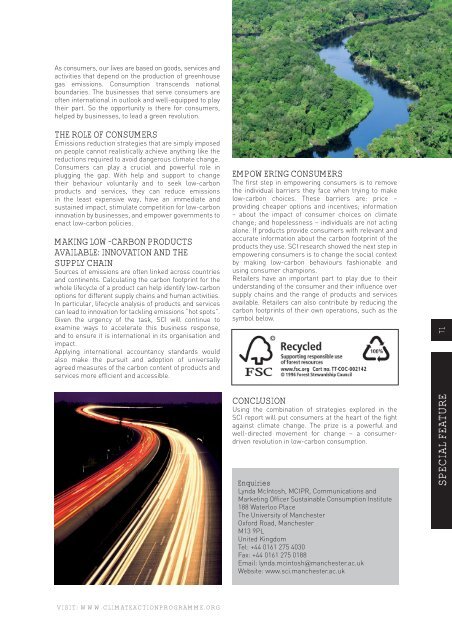Climate Action 2009-2010
You also want an ePaper? Increase the reach of your titles
YUMPU automatically turns print PDFs into web optimized ePapers that Google loves.
As consumers, our lives are based on goods, services and<br />
activities that depend on the production of greenhouse<br />
gas emissions. Consumption transcends national<br />
boundaries. The businesses that serve consumers are<br />
often international in outlook and well-equipped to play<br />
their part. So the opportunity is there for consumers,<br />
helped by businesses, to lead a green revolution.<br />
THE ROLE OF CONSUMERS<br />
Emissions reduction strategies that are simply imposed<br />
on people cannot realistically achieve anything like the<br />
reductions required to avoid dangerous climate change.<br />
Consumers can play a crucial and powerful role in<br />
plugging the gap. With help and support to change<br />
their behaviour voluntarily and to seek low-carbon<br />
products and services, they can reduce emissions<br />
in the least expensive way, have an immediate and<br />
sustained impact, stimulate competition for low-carbon<br />
innovation by businesses, and empower governments to<br />
enact low-carbon policies.<br />
MAKING LOW-CARBON PRODUCTS<br />
AVAILABLE: INNOVATION AND THE<br />
SUPPLY CHAIN<br />
Sources of emissions are often linked across countries<br />
and continents. Calculating the carbon footprint for the<br />
whole lifecycle of a product can help identify low-carbon<br />
options for different supply chains and human activities.<br />
In particular, lifecycle analysis of products and services<br />
can lead to innovation for tackling emissions “hot spots”.<br />
Given the urgency of the task, SCI will continue to<br />
examine ways to accelerate this business response,<br />
and to ensure it is international in its organisation and<br />
impact.<br />
Applying international accountancy standards would<br />
also make the pursuit and adoption of universally<br />
agreed measures of the carbon content of products and<br />
services more efficient and accessible.<br />
EMPOWERING CONSUMERS<br />
The first step in empowering consumers is to remove<br />
the individual barriers they face when trying to make<br />
low-carbon choices. These barriers are: price –<br />
providing cheaper options and incentives; information<br />
– about the impact of consumer choices on climate<br />
change; and hopelessness – individuals are not acting<br />
alone. If products provide consumers with relevant and<br />
accurate information about the carbon footprint of the<br />
products they use. SCI research showed the next step in<br />
empowering consumers is to change the social context<br />
by making low-carbon behaviours fashionable and<br />
using consumer champions.<br />
Retailers have an important part to play due to their<br />
understanding of the consumer and their influence over<br />
supply chains and the range of products and services<br />
available. Retailers can also contribute by reducing the<br />
carbon footprints of their own operations, such as the<br />
symbol below.<br />
CONCLUSION<br />
Using the combination of strategies explored in the<br />
SCI report will put consumers at the heart of the fight<br />
against climate change. The prize is a powerful and<br />
well-directed movement for change – a consumerdriven<br />
revolution in low-carbon consumption.<br />
Enquiries<br />
Lynda McIntosh, MCIPR, Communications and<br />
Marketing Officer Sustainable Consumption Institute<br />
188 Waterloo Place<br />
The University of Manchester<br />
Oxford Road, Manchester<br />
M13 9PL<br />
United Kingdom<br />
Tel: +44 0161 275 4030<br />
Fax: +44 0161 275 0188<br />
Email: lynda.mcintosh@manchester.ac.uk<br />
Website: www.sci.manchester.ac.uk<br />
SPECIAL FEATURE 71<br />
VISIT: WWW.CLIMATEACTIONPROGRAMME.ORG












